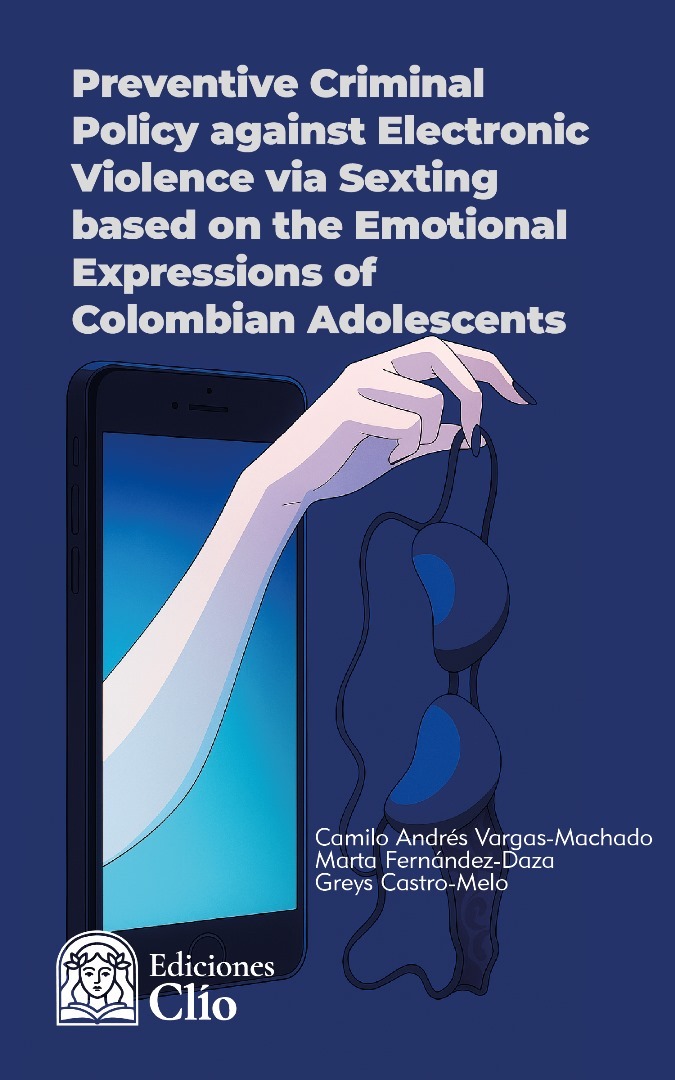
Preventive criminal policy against electronic violence via sexting based on the emotional expressions of colombian adolescents
Vargas-Machado, Camilo Andrés
Fernández-Daza, Marta
Castro-Melo, Greys
Bueno Atencio, Aldair
Editorial:Ediciones Clío
Materia:Saber (Erudición)
Público objetivo:Enseñanza universitaria o superior
Publicado:2025-08-27
Número de edición:1
Tamaño:1Mb
Soporte:Digital
Formato:Pdf (.pdf)
Idioma:Inglés
Libros relacionados
Química de suelos en la selva peruana - RUIZ CAMACHO, WILFREDO; Suarez Rivadeneira, Juan Eduardo; Colmenares Mayanga, Wagner; Delgado Soto, Jorge Antonio; RUBIO CUEVA, LINDER; Díaz Ruiz, Adán
Los residuos orgánicos no son un problema, son una oportunidad: minimización de residuos sólidos orgánicos - Suarez Rivadeneira, Juan Eduardo; RUIZ CAMACHO, WILFREDO; MANAYAY LLAGUENTO, FREDDY ALBARO; Carranza Montenegro, Daniel; Carranza Lizana, Daniel Olivier; PAREDES CARRANZA, JOSE CELSO; Rojas Castillo, Juan Alberto; MUSAYÓN DÍAZ, MAYRA PAMELA; Paredes Guerrero, Angel Wilmer; Suarez Chavarry, Eduardo Benjamín; Bernilla Rodríguez, Eduer Blandimiro; Saldaña Miranda, Marcela Yvone; LLAUCE SANTAMARIA, ROSARIO YAQUELINY; OLIVERA ALDANA, MARIO FÉLIX; Romero Moncada, Juan Alberto
La casa santa de la salud - Romeroez, Ingrid Magally
Resistencia de Morenos Libres en la Jurisdicción de Gibraltar (1820-1840) - Rosales, Alminda
Reseña
This book explores the growing phenomenon of sexting among Colombian adolescents and its implications for law, psychology, and public policy. Drawing on a quantitative study of 242 students in Santa Marta, the authors reveal that nearly half of the participants engage in sexting, often without parental supervision or limits on internet use. The research highlights how this practice, while sometimes perceived as harmless, can lead to blackmail, coercion, emotional distress, and exposure to cybercrime.
A central finding is the strong link between sexting and negative emotions such as shame and guilt, alongside a decline in positive emotional expression. Family communication and parental monitoring emerge as crucial protective factors, capable of reducing risky behaviors and fostering resilience. The book situates these findings within a comparative legal framework, referencing Colombian, Mexican, and Spanish legislation, as well as the Budapest Convention on Cybercrime.
By combining legal analysis with psychological insights, the authors propose preventive strategies centered on education, emotional support, digital responsibility, and inter-institutional collaboration. Ultimately, this work advocates for a preventive criminal policy designed to safeguard adolescents’ rights, promote healthy family communication, and strengthen social awareness against electronic violence in an increasingly digital world




